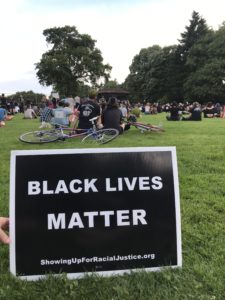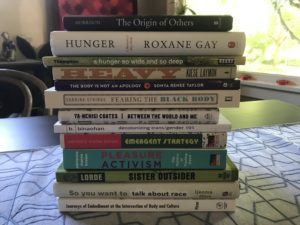Making Your Healing Bigger Than You
One way we dismantle structures is to divest personally from them. We have the power to collapse systems if we include ourselves in the process. This process is about healing and reclaiming body trust.


Right now, solidarity looks like listening, believing, donating, feeling, holding space, asking for consent, giving room, reflecting, and having direct and sometimes difficult conversations with people in our lives.
We know the systems are working exactly as they were designed to. This means we must allow and contribute to the dismantling and unraveling of the lies, excuses, and bypassing that have upheld them.
For the White people reading, it is essential for us to understand the way white supremacy lives and works through us. In this article, Savala Trepczynsky writes:
“Until a critical mass of white people begin and continue the work of anti-racism with their own lives, then uprisings and protests will function more as expressions of black and brown pain than as inflection points in the culture. After all, black and brown people have been resisting, uprising, and protesting in this country for centuries. If that were enough, it would have worked already. The missing link is white people doing deep, honest, and ongoing inventories (and clean-up) of their own relationship to white supremacy.”
Every system and institution in the United States is rooted in white supremacy. It exists in the eating disorder treatment community, where we see how the stories and voices of black, brown, indigenous and other marginalized people are missing. This is one reason Jessica Wilson and Alishia McCullough launched their #amplifymelanatedvoices campaign this week.
Moving away from our insidious conditioning requires a commitment to constantly seek information and engage in new practices of divestment. This is a movement, not a moment and change happens through tiny, consistent acts over time. Here are some ideas to aid your unlearning:
•Take a look at your bookshelves and notice how many authors are White. Commit to reading books written only by Black people (and other marginalized
•Listen to voices unlike your own and be willing to change your mind.
•Find opportunities to learn from Black women and pay them for their labor.
•Allow for discomfort to arise instead of trying to move away from it. Comfort is not real when others live in constant fear and vigilance.
•Learn about white fragility, because it is blocking liberation.
•Quote people’s work. There’s too little attribution to people’s work in our field.
•Let go of your attachment to being one of “the good ones.” We all cause harm.
•Build relationships with people and communities of color that are transformational, not transactional.
•If you have children, talk to them about racism. The Black community does not get a choice about the matter. Your kids need to know about it too.
•Donate, and please don’t make that all that you do. Consider Black Lives Matter, Bail Accounts, the Trans Justice Funding Project, or any organization that centers Black liberation and joy.
For those of you who work in the helping professions, consider:
•Implementing a payment structure to allow for more access and accounts for some of the labor folks with marginalized identities may have to do/experience just to be in your setting (if it is white/cis/het/thin/able-bodied dominant).
•Invest in training to help you investigate how whiteness shows up for you in your role. We recommend this Whiteness at Work webinar with The Adaway Group and this training with Artic.
When we begin divesting from white supremacy and other forms of oppression like fatphobia, we must root out the ways we have been conditioned in a culture of domination.
This is a time for deep reckoning, for humility, for listening and amplifying, and for leaning into the discomfort of not having the answers. For letting things change until they are not familiar. For leaving safety at the expense of others for something big enough to include all of us.
To the Black leaders and teachers, thank you for the sacrifices you make to share your time, wisdom, energy, and light with us. Many of you know the legacy of Pride Month (Happy Pride!) is because of riots started by trans people of color.
Desiree Adaway, one of our dear friends and beloved teachers, reminds us that successful movements do not need perfect people or perfection performances. We show up to do the work and we change with it. We must change.
The credit for everything we’ve written in this newsletter goes to Black leaders, teachers, and artists. Do not praise us for doing what is right.
Please, when you have the energy, let us know when we mess up. Because we have. And we will again.
Join us in fighting fiercely for racial justice.
Let’s love each other fiercely.
And get to work!
In love and solidarity,

If you want some resources we’ve gathered, email us.